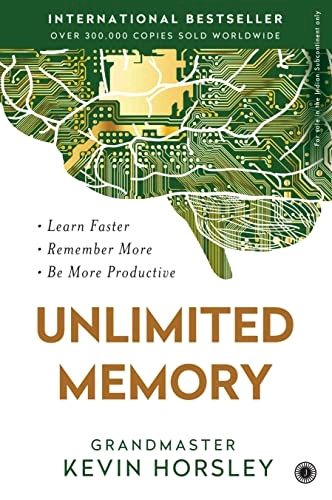Audio available in app
Solving puzzles and playing brain games enhances memory skills from "summary" of Unlimited Memory by Kevin Horsley
Engaging in activities that challenge your brain, such as solving puzzles and playing brain games, can have a positive impact on your memory skills. These mental exercises help to stimulate various areas of the brain, keeping it active and healthy. By consistently challenging your brain in this way, you are essentially giving it a workout, which can lead to improved memory retention and recall. When you solve puzzles or play brain games, you are required to use different cognitive skills, such as problem-solving, critical thinking, and decision-making. These activities force your brain to work harder, forming new neural connections and strengthening existing ones. As a result, your memory capacity and ability to retain information can be enhanced over time. Additionally, engaging in puzzles and brain games can help to improve your focus and concentration. These activities require your full attention and mental effort, which can train your brain to stay alert and attentive. This increased focus can translate into better memory performance, as you are better able to encode and store information effectively. Furthermore, solving puzzles and playing brain games can be a fun and enjoyable way to challenge yourself intellectually. By making these activities a regular part of your routine, you can not only boost your memory skills but also enhance your overall cognitive function. The mental stimulation provided by puzzles and brain games can have lasting benefits for your brain health and memory capabilities.- Incorporating puzzles and brain games into your daily life can be a simple yet effective way to enhance your memory skills. By engaging in these mental exercises, you can keep your brain sharp, improve your cognitive abilities, and enjoy the many benefits of a strong and agile memory.
Similar Posts

Unraveling the mysteries of the brain remains an ongoing endeavor
Understanding the brain is an intricate and continuous process that scientists have been working on for centuries. The complexi...
Varying study locations enhances memory consolidation
When you're trying to commit something to memory, it's not just about how many times you review the material. The way you study...

Break tasks into manageable steps
When faced with a daunting task, it can be overwhelming to think about all the work that needs to be done. This is where breaki...
Respect boundaries and privacy of others
One important aspect to keep in mind when interacting with others is to be mindful of their boundaries and respect their privac...
Understand the science behind effective learning strategies
To truly grasp the essence of effective learning strategies, one must delve into the science that underpins them. By understand...
Prioritizing experiential learning over passive consumption
The path to learning and growth lies in actively engaging with experiences rather than passively consuming information. By prio...
Flexibility in thinking is a valuable skill
Being able to shift gears mentally is a crucial ability in today's fast-paced world. Flexibility in thinking means being able t...

Sleep plays a crucial role in brain health
Sleep, often overlooked in our fast-paced society, is actually a vital component in maintaining brain health. During sleep, the...
Environmental factors also contribute to intelligence
Intelligence is a complex trait that is influenced by a variety of genetic and environmental factors. While genetic factors pla...
Meditation can calm the brain and promote healing
Norman Doidge discusses how meditation can have a calming effect on the brain, which in turn can promote healing. He explains t...


